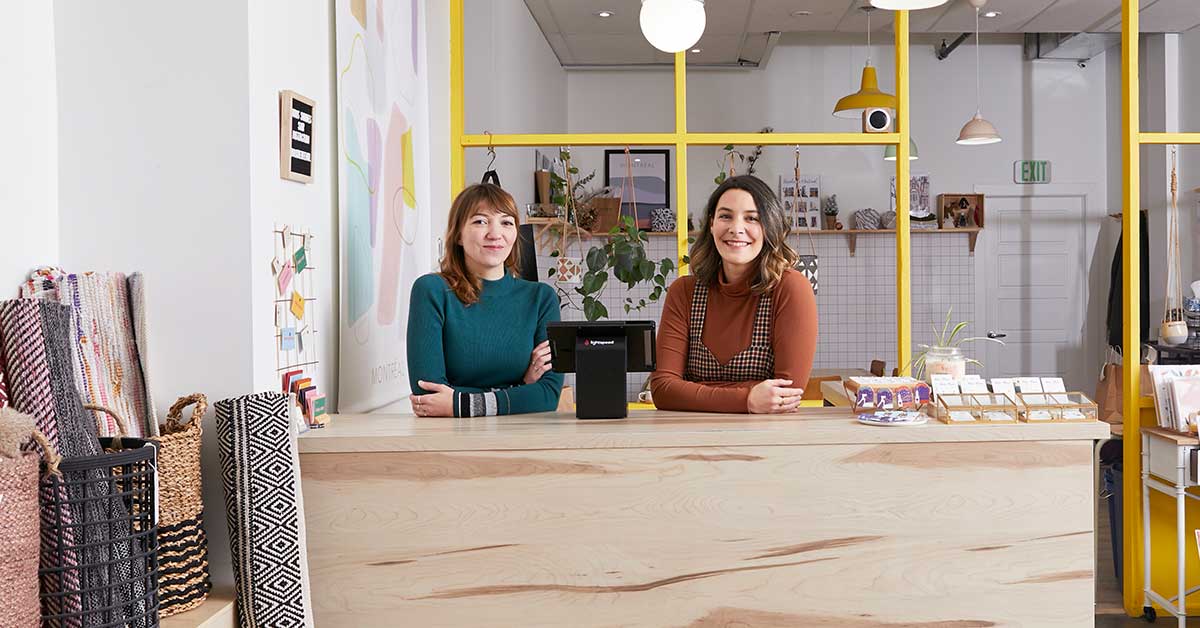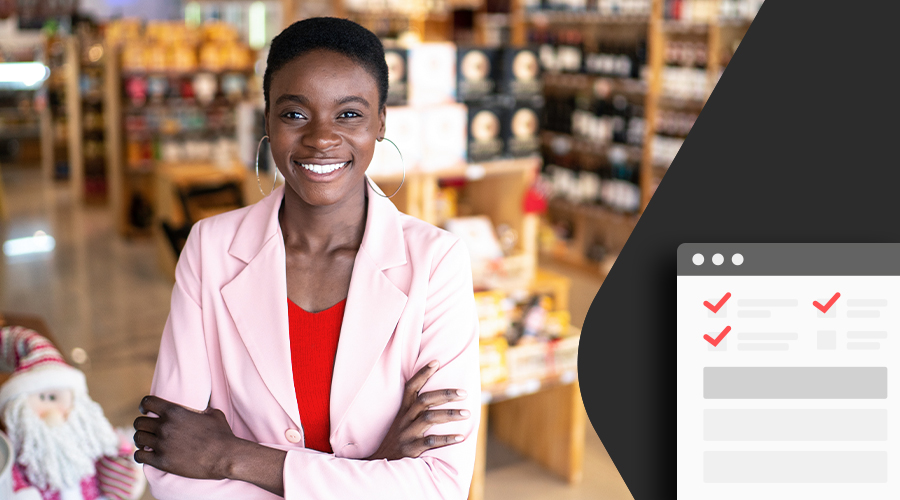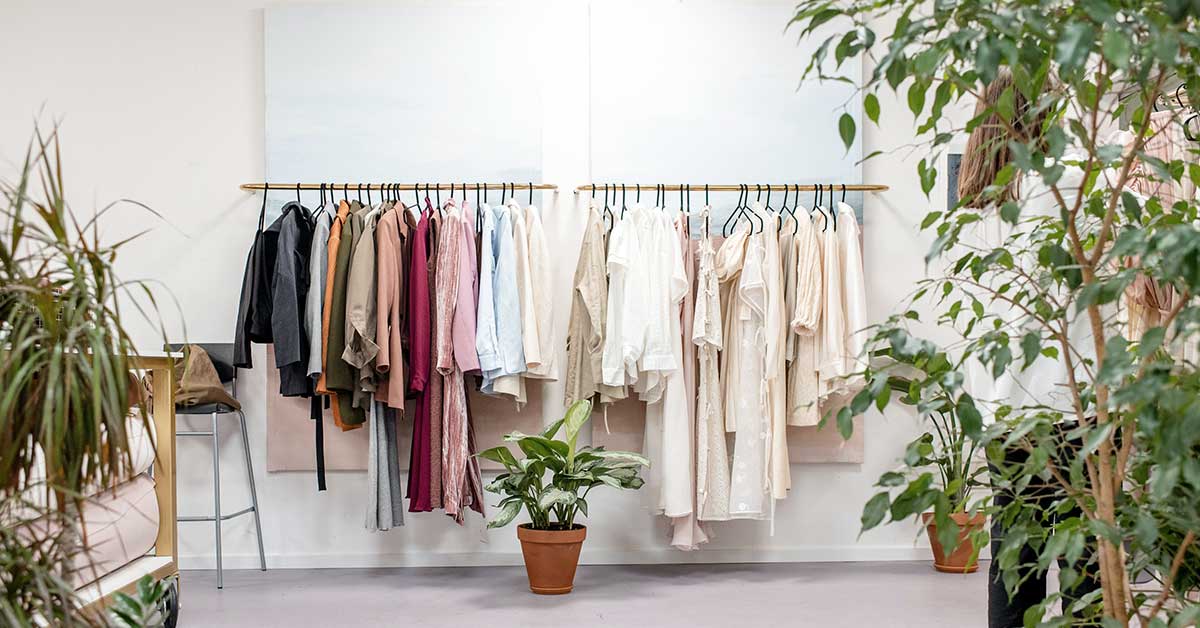
It’s easy to think “product, product, product” when opening your first retail store, but there are a whole host of other must-have retail store supplies you’re going to need too.
Whether they’re for customers, staff, or even for you as the business owner, here are the useful supplies you’ll need as you get ready for your store’s grand opening.
- Point of sale system
- POS accessories
- Checkout supplies
- Displays cases, fixtures and furniture
- Employee and office supplies
- Indoor and outdoor retail signage
- Cleaning products
- Security supplies
- Customer cards
The ultimate business plan template
Start your new store off right with this free business plan template.

What are retail store supplies?
Retail store supplies are everything you need to facilitate sales. Some store supplies, like display fixtures and hardware, are a one-time purchase (or at least, can be expected to last a long time). Others, like receipt paper and shopping bags, will need to be replenished regularly.
Inventory and store supplies are not the same. Inventory is what you sell to customers (or what you use to create the products you sell), while supplies keep the store running and facilitate sales.
This distinction is important, because inventory and supplies are treated differently at a tax level. You probably will need to pay sales tax on supplies you buy, like uniforms for your workers, but not on inventory you order to sell—check with an accountant for the laws in your jurisdiction.
What are fixtures in a store?
Fixtures refers to the displays you use for your products. This includes shelving, clothing racks, cabinets, hooks, tables, jewelry displays—anything you use to show off your products.
Fixtures aren’t store supplies you need to replenish all that often, but they’re still supplies—you’ll record their purchase differently than you do inventory, and pay sales tax on them.
Retail store equipment list
| Category | Supplies and Equipment Needed |
| Point of Sale (POS) System | – Fully functional payment processing system for credit cards, debit cards, and mobile wallets
– Custom gift cards compatible with your payment processor – Advanced POS systems for inventory management, customer loyalty, reports, and data analysis |
| POS Accessories | – Barcode scanners
– Receipt printers and printer paper – Cash drawer – Label printer – Tagging guns – Tech accessories and add-ons (eCommerce integration, analytics and reporting, accounting integrations, loyalty program setup) |
| Checkout Supplies | – Shopping bags (paper or cloth, reusable bags with your logo)
– Tissue paper – Boxes for fragile items – Tape and stickers – Shopping carts and/or baskets – Garment bags – Counter mats – Digital loyalty cards or forms – Queue management tools (ropes, floor stickers) – Bag sealing machines – Disposal bins |
| Display Cases, Fixtures, and Furniture | – Mannequins
– Clothing racks – Hangers – Tables, cabinets, and display cases – Mirrors (aisle and ceiling mirrors for lighting and security) – Slatwall panels and accessories – Shelving units – Wall displays – Pedestals and plinths – Feature lighting – Floor mats and area rugs |
| Employee and Office Supplies | – Uniforms and name tags
– PAs and two-way radios – Communication tools (team collaboration software) – Break room supplies (microwave, kettle, snacks, tea, coffee, water station, first aid kit) – Training and induction materials – Personal storage lockers – Stationery and branding materials – Employee handbook – Essential office technology and software (computer, printer, phone, bookkeeping and accounting software, inventory management software, HR and payroll software, payment processing software) |
| Indoor and Outdoor Retail Signage | – A-frame pavement signs
– Branded awnings – Floor mat signs – Restroom signage – Change room signage – Anti-theft and CCTV signage – Hanging or freestanding banners – Sign holders for printed signs |
| Cleaning Products | – Janitorial supplies
– Mops and buckets – Cleaning products – Supplies for maintenance (paint, hardware) |
| Security Supplies | – HD CCTV cameras
– Security tags – Wired grip holders – Display locks – Magnetic holders – Physical cables |
| Customer Cards | – Cards to encourage social media sharing and return visits for discounts |
What items are needed in a retail store? Your shopping list for opening day
Here are the store supplies you’ll need to run your new business.
1. Point of sale (POS) system
First up, let’s talk about something we’re experts in here at Lightspeed: your point of sale (POS) system. It’s how you’re going to get paid and it’s how you’re going to make it easier for your customers to pay you in different ways.
“Every brick-and-mortar business should have a fully functional payment processing system,” suggests Nick Drewe, the CEO of Wethrift, an ecommerce sales and coupon platform. “Most shoppers no longer carry cash. Nowadays, the average modern-day consumer pays for their daily purchases using credit cards, debit cards and mobile wallets,” he said.
“Reports even show that nearly half of all SMBs in the U.S. get asked about card payments daily. If your business still doesn’t have a POS system, now is the best time to partner with a payment processor,” said Drewe.
Credit and debit cards aren’t the only way customers will want to pay. You’ll want gift cards that are compatible with your payment processor as well. For extra brand recognition, try getting custom gift cards from a vendor like Plastic Printers.
Technically, on your opening day, all you need is a way to get paid. You might be tempted to just get a card reader and forgo more advanced POS systems.
But a POS system can do a lot more than facilitate payments—it can manage inventory, stocking and reordering, customer loyalty and reports and data. In the long run, you’ll want at least some of those functions, and it’s going to be easier (and for customer profiles and sales data, more effective) if you have them on day one. Keep that in mind when you’re picking your POS.
2. POS accessories
To get the most out of your point of sale, you’ll need some POS hardware. While you can operate a store without these supplies, not having them can slow down your employees. Slower customer service doesn’t make a good impression on clients, so make sure you’ve got:
- Barcode scanners: scanners are pretty standard. They save your sales staff from needing to manually enter SKUs at checkout (and make cycle counts and full counts go faster).
- Receipt printers and printer paper: so you don’t need to write out receipts by hand.
- A cash drawer: because while card payments are popular, some people will want to pay by cash.
- Label printer: for printing your price labels.
- Tagging guns: for attaching hanging labels to your products.
Don’t forget the tech accessories
While they’re not store supplies the way POS hardware is, tech accessories and add-ons for your point of sale will make running your store easier. The earlier you set these up, the more useful they are.
Consider:
- eCommerce: today’s customer shops both online and off. Having your eCommerce store set up early means you’re not scrambling to get it off the ground later when you’re busy running the store.
- Analytics and reporting: every time your POS system processes a sale, receives inventory or stores new customer information, it’s gathering data. An advanced reporting add-on will let you access that data and make more informed decisions for the future of your business.
- Accounting integrations: you’re going to need to file taxes for your store at some point. Having an accounting integration from day one means less work for you in the long run.
- Loyalty: how do you foster customer loyalty? By signing them up to a loyalty program, among other things. Get your loyalty program set up for day one so you can start engaging customers right away.
3. Checkout supplies
You’ll need a way for customers to carry their purchases out of your store.
That means shopping bags should be on your store supplies shopping list, as well as padding for fragile items and tape. You’ll need to be careful with the type of bags, too, depending on where your store is located. Single use plastic bags are banned in Canada, for example, so you’d need paper or cloth bags, and/or reusable bags for sale.
Make sure you’ve got:
- Shopping bags of different sizes (paper or cloth if you’re in a plastic ban region)
- Reusable bags (you can add your logo to tote bags for exposure)
- Tissue paper
- Boxes for fragile items
- Tape and stickers
- Shopping carts and/or baskets (if your store is large or you sell heavy items)
- Garment bags (if you sell apparel)
- Counter mats
- Loyalty cards or forms (pro tip: make ‘em digital)
- Queue management tools (ropes, floor stickers, etc.)
- Bag sealing machines
- Disposal bins
4. Display cases, fixtures and furniture
The kind of retail displays and fixtures you need are going to depend fairly heavily on the type of store you’re preparing to open.
You’ll need different store supplies if you’re opening a clothing and apparel store versus, say, a consumer goods or electronics store. But let’s just say you’re actually planning to open up a clothing store for a moment. In that case, you’d likely need:
- Mannequins: the right mannequins will show off your clothing products in the best light.
- Clothing racks: You want some racks so you can display your apparel in various different sizes, colors and categories.
- Hangers: good-quality hangers will store weighty or bulky clothing, while making it easy for customers to see essential information about sizing.
- Tables, cabinets and display cases: these can be useful for merchandising accessories, smaller products and any fragile goods. Choose portable display tables if you want to be able to experiment with different placements within your store.
- Mirrors: help your customers check out how your clothing looks. Aisle and ceiling mirrors can also be useful for other kinds of stores too, because they offer lighting benefits. And they boost your security awareness, by allowing your staff to see store areas and customers from a distance.
- Slatwall panels and accessories: a slatwall is a type of fixture with horizontal slats that you can hang hooks, baskets and more from. You can customize slatwall panels to display whatever you need.
- Shelving units: Versatile shelving can display a variety of merchandise, from folded clothes to accessories. Depending on what type of shelving you have, you could also adjust them to suit changing inventory levels or display needs.
- Wall displays: Utilize wall space for hanging items or displaying merchandise at eye level. This can include mounted racks or hooks, which are especially useful for showcasing accessories like bags, hats, or jewelry.
- Pedestals and plinths: Ideal for featuring high-end or exclusive items. Placing products on pedestals can attract attention to specific pieces and create a focal point in your store.
- Feature lighting: Spotlighting or LED lights can enhance product visibility and create ambiance. Consider adjustable lighting systems to highlight different sections or products seasonally.
- Floor mats and area rugs: Besides adding to your store’s decor, they can also provide comfort for both employees and customers who are standing for long periods.
5. Employee and office supplies
Make sure your employees have everything they need to thrive.
Simple measures like comfortable break out rooms help ensure your staff know they work for someone who recognizes them as individuals and acknowledges their wellbeing.
Here are some of the retail store supplies for employees that you might need:
- Uniforms and name tags: Make an impression and make sure customers can find your staff in the store, with uniforms and name tags.
- PAs and two-way radios: If you have a large floor space, consider installing a public address (PA) system. Two-way radios also help your staff communicate with one another about stock questions, customer enquiries and price checks.
- Other communication tools: Beyond PA systems and two-way radios, consider subscription services for team collaboration software that allows for instant messaging, video calls, and project management.
- Break room supplies: Take care of your employees. Keep your employee break room well-stocked, if you have one. Add a microwave, kettle, snacks and a tea, coffee and water station. Keep a first aid kit on site too in case there’s any minor injuries.
- Training and induction: Think of training binders and other educational resources to help your staff learn about products, customer service, store operations and workplace health and safety.
- Personal storage lockers: Offer employees a secure place to store personal items during their shifts, enhancing the sense of security and privacy.
- Stationery and branding materials: Provide branded stationery like notebooks, pens, and folders to reinforce your brand identity both within the office and when interacting with customers or partners.
- Employee handbook: Create a comprehensive employee handbook that outlines policies, procedures, and expectations, serving as a go-to resource for your team.
Technology and software
Not every retail store will have space for a separate office, but if you do then buy a reliable computer, a printer and phone. Retailers have a huge range of software tailored to them nowadays too, but outside of a POS system some of the most important ones to add to your business include:
- Bookkeeping and accounting software
- Inventory management software
- HR and payroll software
- Payment processing software.
6. Indoor and outdoor retail signage
Customers visit shops with attractive displays and sharply designed signage that grabs their attention and entices them to enter stores. This is why signage counts.
“Signage alerts customers to discounts and promotions. It also leads customers to other parts of the store,” said Austin LaRoche, CEO of ATAK Interactive.
Here are some of the different kinds of retail signs to consider:
- A-frame pavement signs
- Branded awnings
- Floor mat signs
- Restroom signage
- Change room signage
- Anti-theft and CCTV signage
- Hanging or freestanding banners
- Sign holders for printed signs
“Make brief, to-the-point signage,” adds LaRoche. “They should be easy to read and consistent with the store’s theme. Promotional signage isn’t the only form of signage assistance available. With larger-than-life graphics, signage may clearly distinguish shop divisions and show items in action. It provides a visual chance to contribute to a store’s own brand identity.”
7. Cleaning products
Make sure that you have all the retail store supplies you need to keep your store looking clean and well-maintained. Have a think about things like janitorial supplies, mops and buckets, cleaning products and less used supplies like paint and hardware.
Once your business takes off, consider building a maintenance team. “Apart from cleaning the shop regularly, ask them to deal with maintenance issues involving the plumbing, electrical wiring, lighting, and, of course, fixtures,” said Devin Schumacher, founder of digital marketing agency SERP. “Trust me, you’ll no longer have time for cleaning and maintenance duties as soon as your shop gets more foot traffic.”
COVID-safe cleaning supplies
Many customers have become more cautious about the establishments they patronize since the pandemic, adds Schumacher. “Most people avoid crowded, dirty spaces. As such, brick-and-mortar stores should maintain a clean, orderly business space.”
David Morgan, the CEO of Snorkel Mart agrees. “Keeping masks, sanitizers and alcohol-based sprays is crucial for any retail outlet. This not only ensures that your customers feel safe while visiting but also is beneficial for the employees who risk their lives daily in order to serve your company.”
8. Security supplies
Unfortunately, as a brick-and-mortar retailer, you do also have to plan for the possibility of theft. The right security kit can help you put shoplifters off the idea of stealing your products. Useful in-store security supplies include:
- HD CCTV cameras
- Security tags
- Wired grip holders
- Display locks
- Magnetic holders
- Physical cables
The average retail robbery nets more than $7500 for criminals, according to the National Retail Federation’s 2021 National Retail Security Survey. So security supplies should be a top priority for your store.
9. Customer cards
Today, successful retail stores are about more than the core business of selling products. They are about making customers want to return and enjoy their shopping experience.
“Thinking along the lines of encouraging customers to return, you may want to give them a card once they have purchased, encouraging them to share their experience on social media and receive a discount on their next purchase,” suggests Alison Townshend, founder and owner of Luella Fashion and Sassy & Boo Boutiques.
Setting your store up for success
You’ve got a lot on your mind when you’re opening up your first store, but getting the right retail store supplies ready can help you have as smooth an opening as possible.
There’s a whole host of tools, resources and technology to make opening your first store more manageable. Get your business going with Lightspeed’s retail solutions to sell products in person and online.
FAQs
What type of equipment would you use in a store?
The type of equipment used in a store varies based on the nature of the business, but common items include checkout counters, cash registers or point of sale (POS) systems, barcode scanners, scales for weighing products, shelving and display units for merchandise, refrigeration units for perishable goods, security cameras and anti-theft devices, cleaning equipment, and office supplies for administrative tasks.
What does a retail shop need?
A retail shop needs a range of supplies and equipment to operate effectively. This includes inventory (products to sell), shelving and display units for organizing products, POS systems for transactions, shopping carts or baskets for customer convenience, signage for promotions and navigation, security systems for loss prevention, and essential office supplies for day-to-day operations. Employee uniforms, cleaning supplies, and customer service tools like two-way radios may also be necessary.
What is retail equipment?
Retail equipment refers to the tools and machinery used in a retail setting to facilitate the sale and display of merchandise, enhance customer experience, and streamline operations. This encompasses cash registers, POS systems, barcode scanners, display racks and shelves, mannequins, security systems, shopping carts, and baskets, among others.
What is retail store inventory?
Retail store inventory comprises the goods and products that a store has available for sale to customers. It represents one of the most significant assets of a retail business, as managing inventory effectively is crucial for meeting customer demand, controlling costs, and maximizing profitability. Inventory can range from clothing and accessories in a fashion store to electronic gadgets in a tech shop.
What are store supplies examples?
Store supplies include items necessary for the day-to-day operations of a retail business that are not necessarily for sale to customers. Examples include shopping bags, price tags and labeling equipment, cleaning supplies, office stationery, break room essentials (e.g., coffee, tea, microwave), cash rolls for registers, and protective packaging materials for fragile items.
What are retail store assets?
Retail store assets are resources with economic value owned by the store, expected to provide future benefits. These assets can be tangible or intangible. Tangible assets include inventory, store fixtures and fittings, cash registers, security systems, and real estate (if owned). Intangible assets might encompass software licenses, trademarks, and customer lists. These assets play a critical role in the operational efficiency and financial health of a retail business.

News you care about. Tips you can use.
Everything your business needs to grow, delivered straight to your inbox.



![11 Tips To Make Your Pop-Up Shop a Roaring Success [For Retail Store Beginners and Pros Alike]](https://blog-assets.lightspeedhq.com/img/2021/06/2da3ae10-blog-hero_pop-up-shop.jpg)